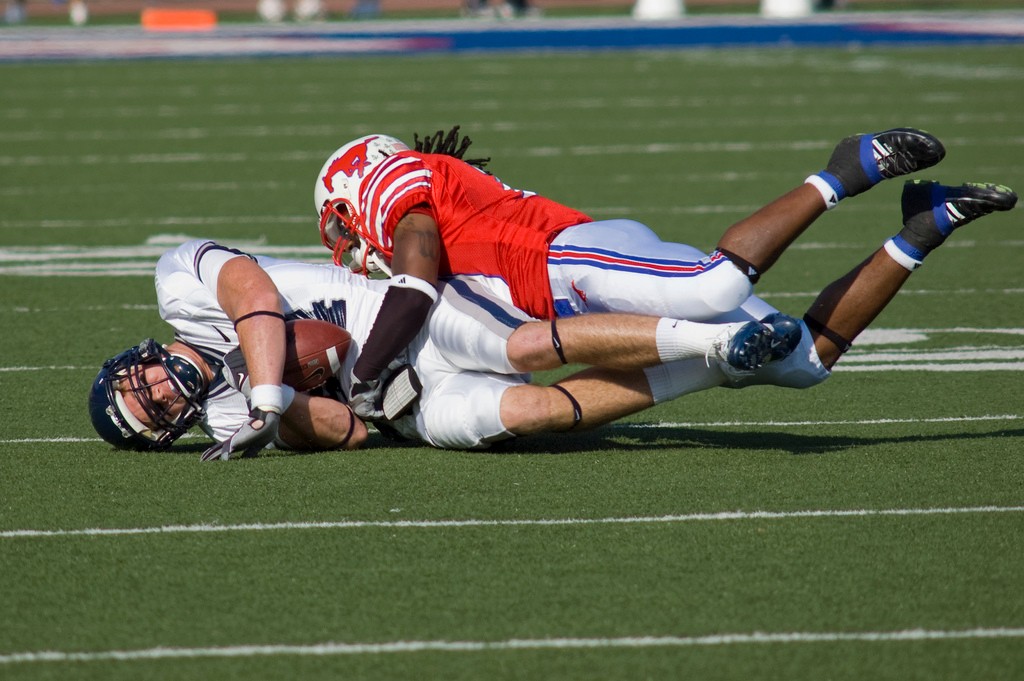Traumatic Brain Injury (TBI) in Football
An overview of traumatic brain injury and football as a cause for such injuries. We also discuss the recent lawsuits filed against the National Football League by retired players suffering from the effects of repeated brain injury throughout their careers.
The sport of football has become one of, if not, the most popular sport in the United States today. However, this full-contact sport puts players at risk for serious injury each time they step onto the field, especially at the college and professional levels. In recent years, the sport has received negative attention specifically surrounding the issue of traumatic brain injury (TBI). In this article, we discuss the basics of TBI and why these types of injuries are so frequently suffered in football. We also offer an overview of the lawsuit regarding brain injury which was brought against the NFL by retired players.
What is Traumatic Brain Injury?
Traumatic brain injury is defined by the industry as a blow or jolt to the head, or a penetrating head injury that disrupts the normal function of the brain. TBI ranges from mild to severe with effects varying from concussion to long periods of unconsciousness or amnesia.
The Relationship between TBI and Football
Recent studies show that traumatic brain injury is the leading cause of death in regard to sports-related injuries.
In football, TBI is usually caused when one player causes a blow or jolt to the head of another player, typically during a tackle.
Most commonly, a player will suffer a brain injury in the form of a concussion. A concussion is a mild form of TBI with a strong recovery rate, usually ranging from 1-2 weeks after the injury has occurred. However, once one concussion is suffered, the player becomes more prone to future concussions. Despite the strong recovery rate of concussions, the same player receiving multiple brain injuries can lead to drastic long-term effects, such as long-term memory loss, brain damage and other psychiatric disorders.
There are no standard guidelines as to when a player suffering from brain injury should stop playing football. However, a player receiving three or more concussions in the same season should consider taking a fairly long break from football in order to rehabilitate.
Lawsuits against the National Football League

The first lawsuit against the National Football League, Inc. was filed in August 2011 naming as Plaintiffs seven former professional players and their wives. The complaint references the NFL’s denial of any knowledge linking brain injury and its effects to its standard practices and policies. The complaint states:
“The defendant and its designated representatives have continuously and vehemently denied that it knew, should have known, or believed that there is any relationship between NFL players suffering concussions while playing, the NFL policies regarding tackling methodology or the NFL policies about return to play and long-term problems such as headaches, dizziness, dementia and/or Alzheimer’s disease that many retired players have experienced.”
Plaintiffs include former Atlanta Falcons defensive back star, Charles Ray Easterling, who committed suicide in 2012 after struggling with career-related dementia and a long life of depression; and former Chicago Bears quarterback, Jim McMahon, winner of the 1986 Super Bowl, who has been diagnosed with dementia.
A unified class action lawsuit was filed in Philadelphia in 2012 in the United States District Court, Eastern District of Pennsylvania which named more than 4,500 retired NFL players as Plaintiffs. This lawsuit referenced similar claims as the originally filed lawsuit regarding traumatic brain injury and the NFL’s practices.
In 2013, the NFL proposed a $765 million settlement deal which attempted to resolve the matter without requiring the organization to admit negligence. This agreement outlined the creation of various funds which would offer aid and financial compensation to future and currently retired NFL players; authorized representatives of former NFL players deceased or legally incapacitated or incompetent; and close family members of retired NFL players. The settlement was denied by United States District Judge Anita B. Brody in January 2014, with concern that the agreement was insufficient and may limit future players with a qualifying diagnosis from receiving proper aid. This issue is ongoing and has yet to reach an end result.
UPDATE: In April 2015, Judge Brody approved a final settlement for the NFL concussion lawsuit. Read more
Taking Action and Preventative Measures
Since the increase in knowledge and rise in reports of traumatic brain injuries in football, the NFL has taken preemptive measures to prevent this issue. Helmets and mouth guards have been introduced as necessary protective gear to help protect players. In 2007, the NFL introduced new concussion guidelines, which included that a player must adhere to professional medical advice regarding whether they are able to return to the football field or face consequences. Also, in 2010, NFL Commissioner Goodell issued a memo to all 32 teams which explained that possible suspensions would be issued to offenders who violated the “hit on a defenseless player” rule.
Football leagues, ranging in caliber from pee-wee to professional, have taken preventative and progressive measures to provide safety to their players throughout the years and continue to make improvements. Though the sport has made strides in its awareness of and action against traumatic brain injury, the NFL, in particular, still faces the issue of traumatic brain damage to current and retired players.
Additional Sources:
https://www.nejm.org/doi/full/10.1056/NEJMp1007051
https://www.cnn.com/2013/08/30/us/nfl-concussions-fast-facts/






